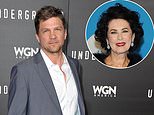Rape. Raw violence. Vulgarity. Why are children’s books today so VILE, asks children's author Lynne Reid Banks?
- Lynne Reid Banks believes that today's children's books are unsuitable
- Books such as Twilight and The Hunger Games contain adult themes
- She wishes for a return to the innocent children's book of the past

Lynne Reid Banks believes that books such as the Hunger Games, above, aren't suitable for children
For more than 40 years, I've been writing for young readers of all ages but it has recently dawned on me that if I'm going to be lucky enough to continue writing and publishing for much longer, there will have to be some changes made, because I seem to have lost my connection with the zeitgeist.
In the past few days, I've found myself making headlines over a letter I wrote to the Guardian newspaper about David Almond's new love-and-death-story A Song For Ella Grey, which has just won the paper's children's book prize.
I had bought two copies for my 12-year-old grandchildren, trusting it would be suitable. 'In the first few pages,' I wrote, 'there is lesbian love, swearing, drinking, and enough other indications that, once again, this is not a book for children. Children are people up to the age of 12. They are not grown-ups of 17.'
That a book with such adult content had won a children's prize seemed to me to show that, as I argued, 'publishing is not a children's world any more'.
I was invited on to Radio 4's Today programme to debate the subject with the prize-winning author. But my quarrel is not with David Almond who, as I said on air, is one of the best writers for young people that we have, but with what is being presented as suitable for children.
A writer friend of mine who had once had a book turned down told me: 'If you create a cereal called Wheaticrunch and nobody buys it, you'd better throw it out on the birdtable and develop Oatipops instead.'
This has made me suspect that in terms of my recent children's books I am still making Wheaticrunch, which sold well enough but - alas! - is severely lacking in such essential current ingredients as violence, rape, sex (straight and otherwise), drinking, swearing, general dystopia - not to mention good old stand-bys like werewolves, vampires, evil stepmothers, all laced with buckets of bodily fluids.
While considering my next book, I have been doing some research. I looked at all those thick, black volumes that crowd the shelves in children's book sections. I read some of them. I read reviews of prize-winners, best-sellers and others. Meanwhile, I volunteered as a reading helper in a primary school. You can bet I've been taking note of the books my seven-to-11-year-olds have brought me to read from.
One little boy was reading to me about a child apparently changed by magic into a lump of snot when I said: 'Jack, I'm sorry, but I think I'm going to throw up. Please find me another book.' I said much the same to a girl of nine who read to me about a boy who lives for ever and kills the girl he loves in each generation by giving her what she called a 'deep kiss'. (Her mother had got her all three books in the series for her birthday.)
Some people would say I shouldn't have spoken out but instead rejoiced and silently offered these authors my gratitude for getting children to read at all.

Author Lynne Reid Banks, pictured, wishes that modern audiences would appreciate innocent children's literature such as Swallows and Amazons and Enid Blyton, and not want to read about violence and death
They have evidently taken on board the fact that the world turns, and children's tastes change.
Frankly, though, I wish I could revert to being a writer like Arthur Ransome, of Swallows And Amazons fame, or Noel Streatfield, who wrote the wonderful Ballet Shoes series, or Enid Blyton - or even myself a few years ago, when I was writing about a plastic Indian who comes to life, and a hamster called Houdini and a poisonous centipede called Harry.
The tragedy is that equivalent stories might not work for a modern audience, or sell in any numbers. They might fail to reach the children I want to reach and fail to make them grab my books and eat them up the way they are eating up the books I'm taking objection to. (I'm not denying that many of these modern books are extremely well-written; I just don't think what is in them is suitable for children.)

The author says that the content of A Song For Ella Grey, which includes sex and drinking, isn't suitable
A few Christmases ago, I went with my seven-year-old granddaughter to the theatre to see Bluebeard. In it, wives were done to death and one woman was hurled across the stage by the cruel anti-hero. I found it hard to watch but the entire child audience was riveted.
This is what grips children and convinces them that theatre is exciting. Equally, a lot of comedy, on stage and in children's books, such as those of the multi-selling David Walliams, depends on toilet humour and other vulgarity, which needless to say, kids lap up.
But I do question just how far today's publishers are going in feeding such appetites and ignoring questions of what effect these books may be having on their young readership.
What about the Hunger Games, the dystopian series about teenagers and children being forced to fight to the death? The Twilight Saga, featuring vampire romance, bloody deaths and an agonising birth scene? Nightworld, a supernatural series along similar lines?
Children love them but what happens when they read such books? Are they being coarsened?
Years ago, I told a friend that when I took my very young sons to the film of Oliver!, I pretended to have dropped my wallet and made them dive for it so they wouldn't be 'exposed' to the brutal death of Nancy at the hands of her lover Bill Sikes.
When I related this, my friend said: 'But you can't protect your children!'
I was shocked. If you rightly feel obliged to protect their young bodies, why not their minds? Today, it seems many parents and publishers feel it important to get them reading no matter what.
Perhaps we should just give them what popularity tells us they love.
Some who defend these books argue that introducing children to violence and other horrors, which are some of the greatest challenges of adult life, is a kind of inoculation process, inuring them to the worst shocks in the world they are growing up in.
A few years ago, someone stood up at an event for children's authors and told us: 'What you have to reckon on is that your potential readers have all killed 40 androids on their Playstations before breakfast. That's what you've got to compete with.'

Lynne says that The Twilight Saga, featuring vampire romance, bloody deaths and an agonising birth scene, shouldn't be read by under-12s
I wonder if some authors didn't take this a bit too seriously.
At the crux of it all is the question: does it matter what children read, as long as they do read? Many think it doesn't, but I believe it does. We talk about books changing lives but if they do then we must ask what effect these successful recent children's books, with their sex and violence and darkness, are having.
They are not a positive force when inquiring minds should be fuelled by escapism and flights of imagination. One has only to look at the recent winners of the Carnegie Medal, the UK's most prestigious prize for children's writing, to know that something is wrong.
This award is chosen by librarians, whose job it is to encourage children to read. I question whether their choices are always appropriate for a prize with the word 'children' in its title.
Consider some recent victors: one about a toddler who escapes the murder of his family and is 'taken up' by ghosts, a sci-fi war story full of bloody battles, a mother-dying-of-cancer story, a hair-raising one about a boy shut in an underground prison by a sadist, which not only comes to no resolution but ends with the narrator's death, and one about a black girl during the American Civil War who sees her mother being raped and lynched. Are these books for under-12s?
I am not saying we shouldn't introduce war, sex or cruelty into children's books. Jacqueline Wilson and Judy Blume often write about these things, but do so sensitively. Even fantasies don't need to steer clear of the problems children will face as they grow up.
But to award writers, however gifted, with children's writing prizes for books for 17-year-old adults isn't fair to those of us who are trying to let kids be kids for a while longer. Now, shall I get back to my story about a little girl who can communicate with a loch monster? Ah, why bother?
Uprooted, Lynne Reid Banks's latest children's book, is published by HarperCollin
Most watched News videos
- Scottish woman has temper tantrum at Nashville airport
- Tesla Cybertruck explodes in front of Trump hotel in Las Vegas
- Mass panic as New Orleans attacker flies down Bourbon street
- Shocking moment zookeeper is fatally mauled by lions in private zoo
- Horrific video shows aftermath of New Orleans truck 'attack'
- Meghan Markle celebrates new year in first Instagram video
- Tesla Cybertruck burns outside Trump hotel in Las Vegas
- See how truck that drove into crowd made it through police barrier
- Cheerful Melania Trump bops to YMCA at Mar-a-Lago NYE bash
- New Orleans terror attack suspect reveals background in video
- Plane passenger throws drink at flight attendant in boozy fight
- Horrifying moment yacht crashes into rocks and sinks off Mexico coast






























































































































































































































































































































































